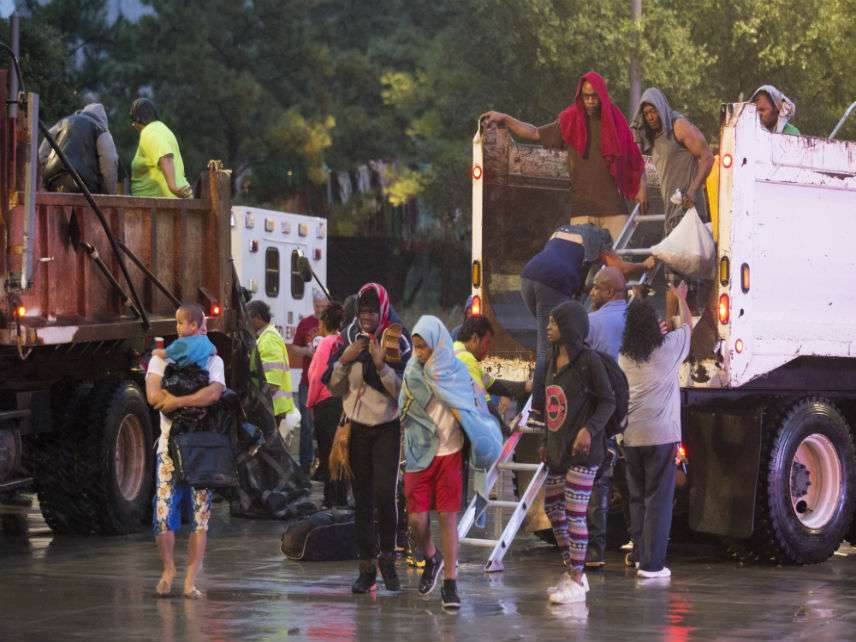The Private 'Cajun Navy' Shows the Glory, and Necessity, of Private Disaster Aid
Hurricane Harvey has made a life-threatening mess too serious to rely on just government-managed aid.
After a natural disaster of the hideous and shocking scope of the floods along the Texas coast this week, government response will never be—can never be—sufficient to people's needs, either for immediate rescue or for long-term rebuilding.
If you don't believe a libertarian on that point, a friend of mine with zero ideological antagonism toward government experienced in volunteer disaster relief in post-Katrina New Orleans and elsewhere stresses to all his curious Facebook followers that government, local or federal, is just not actually equipped to deal with providing all the help people require when storms like this hit, the existence of agencies with names like "Federal Emergency Management Agency" (FEMA) notwithstanding.

FEMA, as Mark Lisheron explained yesterday, brings with it as much or more harassing control and time-and money-wasting bureaucratic bungling as it does actual intelligent, well-managed life-saving aid.
The New Yorker this week shines a light on one of the real solutions in the wake of disaster, one that thankfully doesn't feel obligated to wait for government orders, funding, or control: the Cajun Navy, a private organization out of Louisiana skilled and experienced at boat rescues of people trapped in (or on top of) their homes in a flood.
The Cajun Navy's John Bridgers says modern private technology/communication companies like Facebook make the all-important communication of who is in need of help and where much easier, even as government's 911 is strained beyond its capacities, as Houston Mayor Sylvester Turner admitted it was.
Reason's Jesse Walker has reported and argued in the past, the issue isn't just governmental vs. private: even big private bureaucracies such as the Red Cross fall prey to institutional imperatives and the impossibility of accurate and fast-moving local knowledge that make them often inefficient and ineffective.
As Walker wrote in 2014 (though not discussing the Cajun Navy specifically) "such networks [are known] to be more flexible, more capable of adjusting to conditions on the ground, and—when the groups are themselves locally based—more receptive to local knowledge" in delivering needed aid quickly and smartly.
Walker has also importantly reported on the fact that humans in deemed-ungovernable post-disaster situations actually have a greater tendency toward self- and other-aid than toward reduction to some sort of violent and chaotic Hobbesian "state of nature."
The men and woman of the Cajun Navy live out the message of Walker's reporting: the attitude that we must, or can, rely on public bureaucracies in moments of great crisis is insanely unsafe and wildly un-American. As we see so often, Americans inspired not by central commands and government contracts but by the will and desire to help, exist and rise to the occasion.
It is, alas, never enough to either save everyone that needs saving or fully blunt the terrifying damage nature can cause, and no single source of aid will get everything right. But privately organized and funded aid is real, and necessary, and can be as simple and direct as what the Cajun Navy's Bridgers told The New Yorker: "We're all sportsmen around here," he said. "Pretty much every other person has a boat. So we got going."


Show Comments (33)